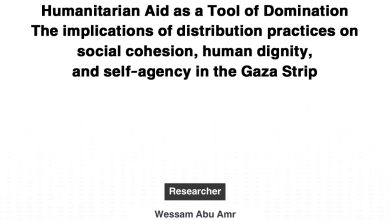Palestinian Perspectives on a Unity Government
By Mohammad Yaghi
On March 10, Fatah and Hamas began a new round of talks in Cairo that center on creating a Palestinian national unity government, reorganizing security forces, reforming the Palestine Liberation Organization (PLO), and holding elections. Despite both sides having incentives to reconcile, fundamental disagreements make a comprehensive political agreement unlikely, and the probable outcome of the talks will be an interim settlement aimed at reconstruction of the Gaza Strip. Even so, both sides may see a unity government as has having some advantages, and if the talks progress, Palestinian Authority (PA) president Mahmoud Abbas will need to balance the promise of such an arrangement with the likely perils: harming improved economic conditions in West Bank, curtailing aid flows from Washington, and undercutting security ties with the United States and Israel. For its part, Israel may not view a unity government as being in its interest and could use levers to undermine either its formation or its effectiveness.
Incentives for Abbas
Although Abbas has avoided unity talks with Hamas since the group’s 2007 takeover of Gaza, three factors are now pushing him toward reconciliation. First, Abbas’s ties to Egypt have grown since the 2007 takeover. Cairo’s rejection of Hamas authority in Gaza, its refusal to open the Rafah border crossing between Egypt and Gaza, and its insistence on Abbas’s legitimacy despite the expiration of his presidential term in January 2009 make it difficult for Abbas to rebuff the Egyptian initiative for dialogue. Furthermore, Abbas believes the Egyptians — unlike previous intermediaries — will press Hamas to compromise.
Second, the prospect of a right-wing Israeli government has convinced Abbas to rearrange his house immediately. When Binyamin Netanyahu comes to power, Abbas believes the peace process will head toward stalemate. Abbas also faces increasing calls by influential Palestinians to discontinue negotiations with Israel as long as settlement activity continues. In Abbas’s view, a unity government supported by Arab countries and the international community would help keep the peace process alive.
Finally, pressure is mounting on Abbas from important constituencies within Fatah. Ahmed Qurei and Marwan Barghouthi’s blocs believe that Abbas’s conduct during the Israeli incursion in Gaza hurt the movement’s popularity and that easing the conditions for dialogue would boost Fatah’s popularity and allow it to blame Hamas if the talks fail. Furthermore, reconciliation with Hamas would help improve Fatah’s organizational strength in Gaza by ending Hamas’s organized campaign to kill or imprison Fatah members and shutter its civil society organizations. A unity agreement would also allow Abbas to extend his term in office and gain broader legitimacy among Palestinians.
Incentives for Hamas
Hamas’s top priorities include facilitating the flow of reconstruction aid into Gaza, ending the PA campaign against Hamas activists in the West Bank, and ensuring the continued financial support of Arab states.
The economic siege and destruction of Gaza have created a difficult environment for Hamas to maintain public support in the Strip. A lack of funds and closed border crossings hamper efforts to begin the estimated $2.8 billion reconstruction. Hamas believes an agreement with Fatah would ensure the flow of money and material into Gaza and give it a managing role at the Rafah border crossing. Egyptian foreign minister Ahmed Abu al-Ghait has seemed to accept this arrangement, stating that his government “cannot ignore the force [that] exists on the ground when the Rafah crossing is opened.”
A unity government would also eliminate the constraints on Hamas activities in the West Bank. An agreement would reopen Hamas’s social and charitable organizations and release the more than 400 Hamas activists in PA prisons. Among Arab states, there is growing support for Palestinian unity. In fact, the Gulf states refused to channel their $1.65 billion Gaza reconstruction pledge through either the PA or Hamas, electing instead to set up an independent Arab League mechanism.
The Fayad Factor
Hamas views PA prime minister Salam Fayad as a foe, and many in Fatah are also wary, viewing him as a competitor appointed by Abbas to ensure the flow of money to the PA. While Fayad has earned international confidence for running a transparent financial system, he is still an independent without a political base and depends to a large extent on Abbas’s support.
On March 7, Fayad announced his intention to resign for three reasons. First, if the Cairo talks succeed, Fayad is unlikely to remain prime minister, since Hamas wants him removed and Fatah will not defend him. Hamas holds him responsible for arresting its activists in the West Bank, closing Hamas charitable organizations, and dismissing its employees from the PA. Fatah officials have long clashed with Fayad over his refusal to cede ministries to Fatah, his early retirement plan for PLO and security forces employees, and his control of the PA financial system.
Second, the Arab states’ decision to bypass Fayad’s PA government in delivering reconstruction money was a sign that they consider his government part of the problem between Fatah and Hamas. As such, Fayad is convinced that Abbas will not be able to withstand the pressure from the Arab states to reconcile with Hamas.
Third, despite the huge international aid pledges during the December 2007 Paris conference, Fayad has faced a monthly financial crisis since August 2008. Delays in transferring donor monies have forced a frustrated Fayad to suspend civil servant salaries and borrow from banks.
Nonetheless, since Abbas has asked Fayad to remain in his post until the new government is formed by the end of March, Fayad may have a chance to remain prime minister if the Cairo talks fail.
The Prospects
Although Hamas and Fatah have failed to implement a February 27 confidence-building agreement calling for prisoner releases and an end to media incitement, both seem keen to strike a deal. Fatah and Hamas will struggle, however, to resolve three areas of fundamental disagreement.
Government. Abbas’s approval of a new Palestinian government is conditional on Hamas’s acceptance of PLO obligations, including past agreements with Israel and the principle of a two-state solution. Abbas prefers forming a government comprised mainly of independents who accept his conditions. But Hamas seeks a unity government that would, in Hamas political leader Khaled Mashal’s words, “protect the resistance and the Palestinian national constants.” Mahmoud Zahar, former foreign minister in the Hamas government, declared that “a government of independents is going to be weak and ineffective” and that his movement accepts a Palestinian state on the prewar lines of 1967 but does not accept a two-state solution.
Security forces. Abbas wants his forces to return to Gaza and expand the security forces reform program, supervised by the U.S. security coordinator, Lt. Gen. Keith Dayton, to include Gaza. Hamas aims to reverse the reform plan by reorganizing the security forces and redefining their mission to include Palestinian “resistance” against Israel.
PLO. Reforming the PLO is a top Hamas priority. Hamas placed Musa Abu Marzouq and Mahmoud Zahar, two of its top leaders, on the PLO committee charged with developing a mechanism to implement the March 2005 Cairo agreement, which called for expanding and reforming the PLO. Fatah, on the other hand, has appointed a lower-level official, Zakaria al-Agha, to the committee, indicating that it is in no rush to reform the PLO.
Despite their differences, the intervention of Arab states, Hamas pressure, and Fatah’s own needs may well produce an interim government to facilitate the reconstruction of Gaza and to cope with the new right-leaning Israeli government. Beyond that, what divides Fatah and Hamas will remain in place.
The duration of a possible agreement depends largely on the reaction of the international community. U.S. secretary of state Hillary Clinton reiterated at the recent Sharm al-Shaikh summit that the Quartet’s conditions for dealing with any Palestinian government will likely remain valid no matter what comes out of the Cairo dialogue. The Israeli reaction will also be vital: a prisoner exchange that includes the increasingly popular Marwan Barghouthi, currently in an Israeli prison, would strengthen the agreement between Hamas and Fatah considering that he favors reconciliation with Hamas. If, however, Israel keeps the crossings closed and Gaza reconstruction does not move forward, Hamas will have little incentive to keep the agreement with Fatah.




